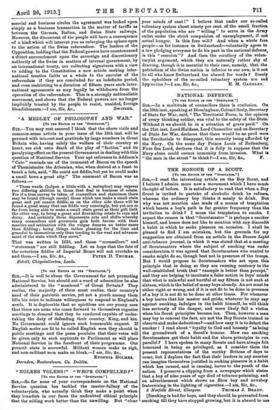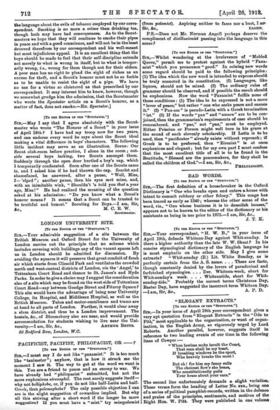THE HONOUR OF A SCOUT.
[To THE EDITOR OF Tux "SPECTITOR...] SIR,—I read the interesting article on the Boy Scout, and I believe I admire more now a movement which I have much thought of before. It is satisfactory to read that when a Boy Scout is invited to partake of alcoholic drink he refuses, whereas the ordinary boy thinks it manly to drink. But why was not mention also made of a means of temptation which besets a boy's path in far greater frequency than the invitation to drink ? I mean the temptation to smoke. I expect the reason is that " Scoutmaster " is perhaps a smoker himself, and hence does not like to mention with any discredit a habit in which he seeks pleasure on occasion. I shall be pleased to find I am mistaken, but the grounds for my suggestion are obtained from an article in the Beacon Light anti-tobacco journal, in which it was stated that at a meeting of Scoutmasters where the subject of smoking was under consideration it was agreed that Scoutmasters who wanted to smoke might do so, though best not in presence of the troops. But I would propose to Scoutmasters who act upon this principle that in doing so they are running contrary to the well-established truth that "example is better than precept," and they are helping to inculcate a false notion in boys' minds that what is unlawful and hurtful at say fifteen is not such at sixteen, which is the belief of many boys already. An act must be either right or wrong, and if it is not fit to be done in presence of a boy it is not fit to be done at other times. For whenever a boy learns that his master and guide, whatever he may say against smoking, indulges in the habit himself, he will think less seriously of the danger, and more likely fall a victim when his Scout principles become lax. Then, however a man may try to conceal the fact, are not the Boy Scouts trained to observe and make deductions ?—and how easy it is to detect the smoker ! I read about "loyalty to God and honesty" as being the groundwork of a Scout's honour. How can smoking Scoutmasters get their habit and the above principles to run parallel ? I have spoken to many Scouts and have always felt honoured in being so privileged, as I consider them the present representatives of the worthy Britons of days to come, but I deplore the fact that their leaders in any number can imagine themselves justified in seeking pleasure in a habit which has caused, and is causing, havoc to the youth of the nation. I preserve a clipping from a newspaper which states that a boy of nine years of age died of tobacco-poisoning, and an advertisement which shows an Eton boy and newsboy fraternizing in the lighting of cigarettes.—I am, Sir, &c.,
5 Norfolk Street, Glasgow. THOMAS J. BRADY. [Smoking is bad for boys, and they should be prevented from smoking till they have stopped growing, but it is absurd to use the language about the evils of tobacco employed by our corre- spondent. Smoking is no more a crime than drinking tea, though both may have bad consequences. As to the Scout- masters we hope that they will continue to smoke their pipes in peace and with a good conscience, and will not be in the least deterred therefrom by our correspondent and his well-meant but most injudicious appeal. It is an excellent thing that the boys should be made to feel that their self-discipline extends not merely to what is wrong in itself, but to what is tempor- arily wrong, i.e., wrong for them though not for their elders. A poor man has no right to plead the sight of riches as an excuse for theft, and a Scout's honour must not be so feeble as to be unable to resist the sight of a pipe. We have no use for a virtue so cloistered as that prescribed by our correspondent. It may interest him to know, however, though we somewhat grudge him the admission, that the Scoutmaster who wrote the Spectator article on a Scout's honour, as a matter of fact, does not smoke.—En. Spectator.]



























































 Previous page
Previous page